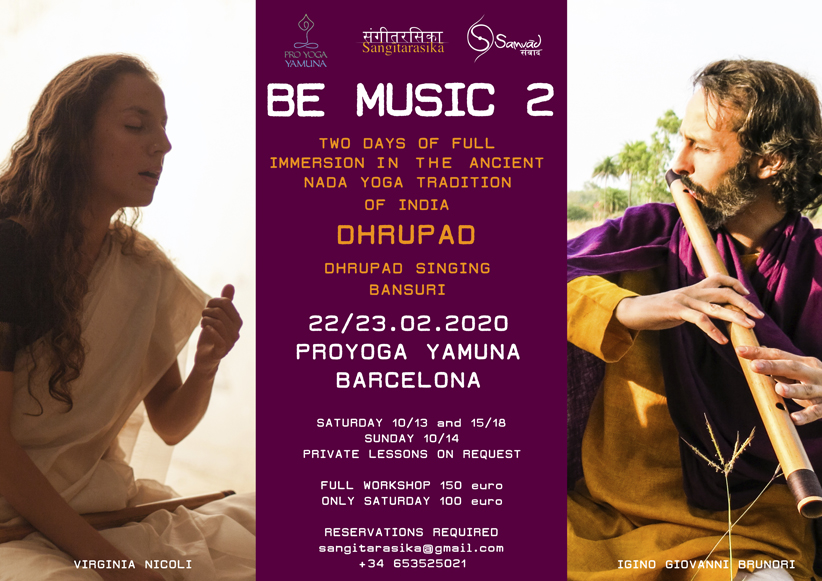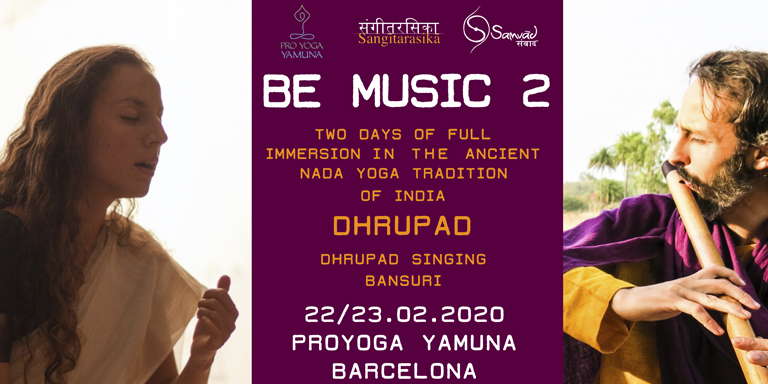It’s always a big pleasure to welcome Samvad, Virginia and Igino to Barcelona. We will meet in Proyoga Yamuna as the last year, this time to deepen into rāga Durga. Workshop is taking place February 22nd-23rd.
This workshop is open to anyone who wants to explore voice and sound, regardless of their technical level and music experience. Whether singers, flutists or instrumentalists of all kinds. We will work both, collective and individual.
WORKSHOP CONTENTS
– The natural voice. Voice production techniques and their practice
– Introduction to rāga Durga (ascending-descending movements, svaras, paltas)
– Development of Ālāp
– Development of rhythm; tāla and laya practice
– Learning a traditional fixed composition –bandiś– settled in rāga Durga
HINDUSTANI MUSIC
The Indian musical system has two central axes; rāga and tāla. The rāgas are melodic modes from which music develops. Each rāga uses a specific set of musical notes and the way these notes relate to each other define the character and essence of each particular rāga. Traditionally, each rāga is associated with a specific time of the day, season or a certain emotion called rasa.
The other main axis and essential element of indian music is its rhythmic system; the tāla. This has evolved over thousands of years and is considered an art form in itself. At its foundations are the concepts of time, space and sound perception. Tāla system gives much attention to the aspects of composition and improvisation, and a broad spectrum of rhythmic, structural and timbral variety.
DHRUPAD
Dhrupad is one of the oldest genres of Hindustani classical music and is based on natural harmonics. Is one of the most traditional style of Hindustani classical music that has preserved its form to date by successions of masters in the traditional teaching method guru-śiṣya paramparā. Although Dhrupad traces its origin to the text of Sāmveda, it has its proven origins around the 15th century and was closely connected to the vaishnava devotional sect but very soon became the official music of the Hindu and Mughal courts until the 19th century.
This refined music has the power to amaze us by its simplicity and purity. Dhrupad music is an experience of sound and could bring to us feelings of devotion, serenity and introspection.
During the last fifty years the genre had been through an important revitalization thanks to the recent generations of musicians such as the Dagar Brothers, Pt. Vidur Mallick and sons, Zia Mohiuddin, Zia Fariduddin Dagar, R. Sanyal, Gundecha Brothers and Udai Bhawalkar that, together with todays generation of young musicians, are going deeper to explore and widen the confines of rāga music, as well as teaching this tradition both in India and around the world. The Dagar lineage gives special emphasis on intonation. Their sound is characterised by long and sustained notes, especially in the first part of the ālāp, which is presented in an extended form. For this part, specific syllables are used at the end of which the fixed poetic composition or bandiś and its rhythmic-melodic variations occur.
Dhrupad singing improves the quality and richness of the voice, helps us to develop musical ear and refines sensitivity. An attentive and regular practice generates harmony and well-being in the body, mind, emotions and environment.
SATURDAY 22nd FEBRUARY 10-13 / 15-18
SUNDAY 23rd FEBRUARY 10-14
Full weekend: 150 €
Saturday: 100 €
Students, unemployed and retired people: 130 €
Info & Reservations
sangitarasika.org / sangitarasika@gmail.com +34 653525021
Reservation is 50% of the fee & is nonrefundable
Any kind of instrumentalists please contact us for more information about how to join the group with your instrument
PROYOGA YAMUNA
C/ Ravella, 12, Entl. 3a. 08021, Barcelona
proyoga-yamuna.com

Organised by Saṅgītarasikā and Samvād collaborating with Proyoga Yamuna

